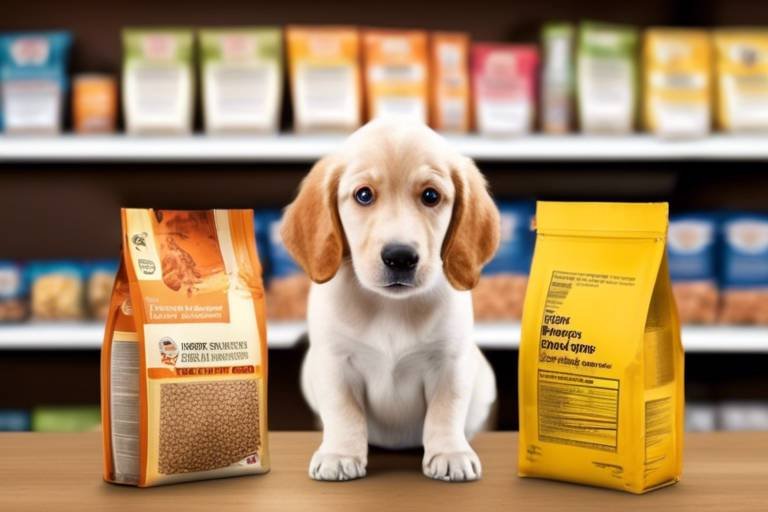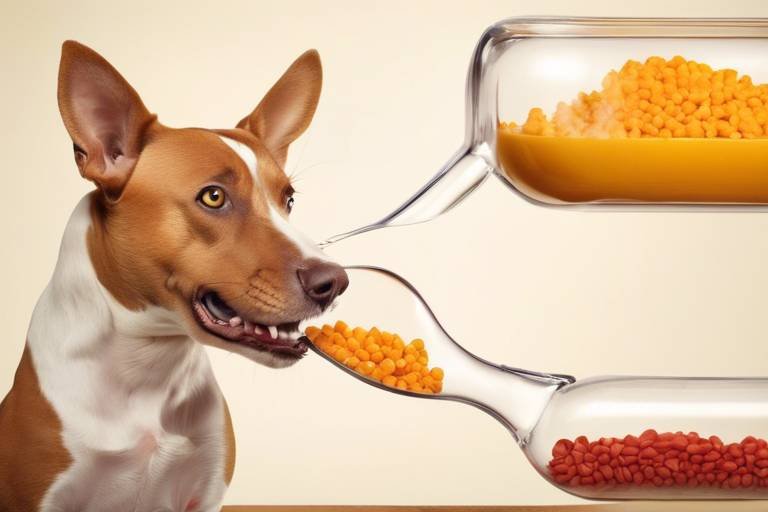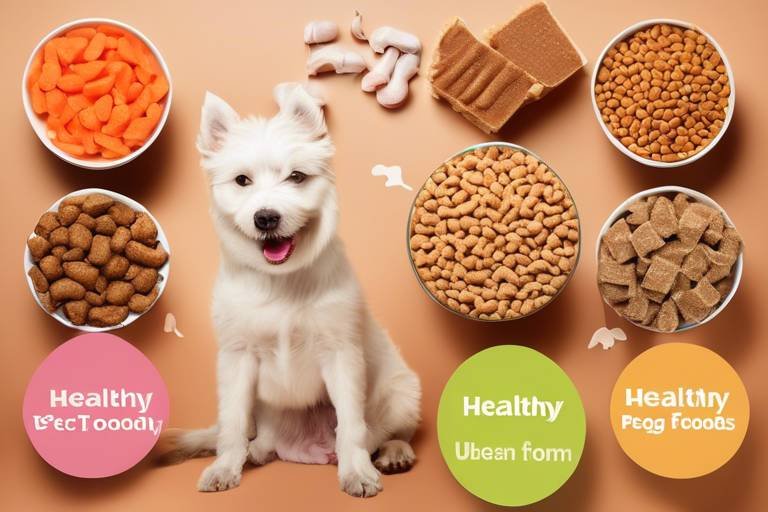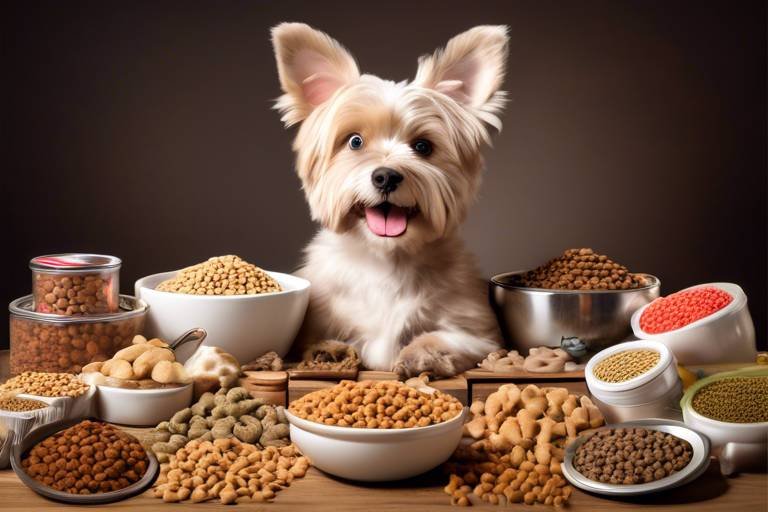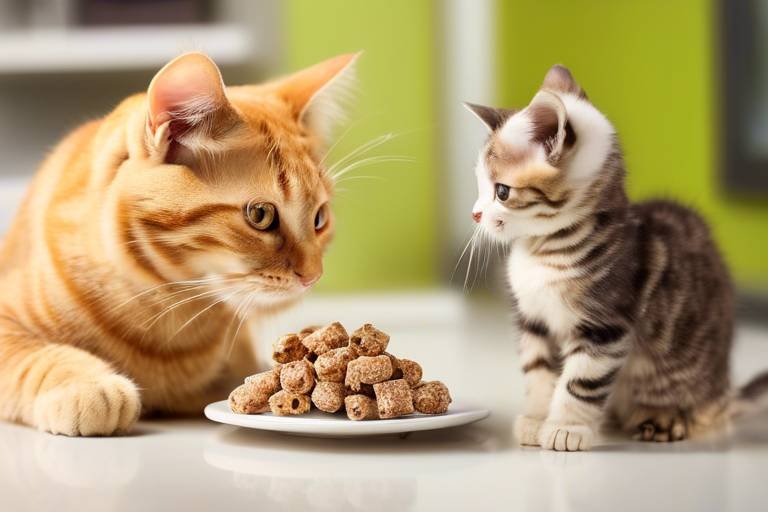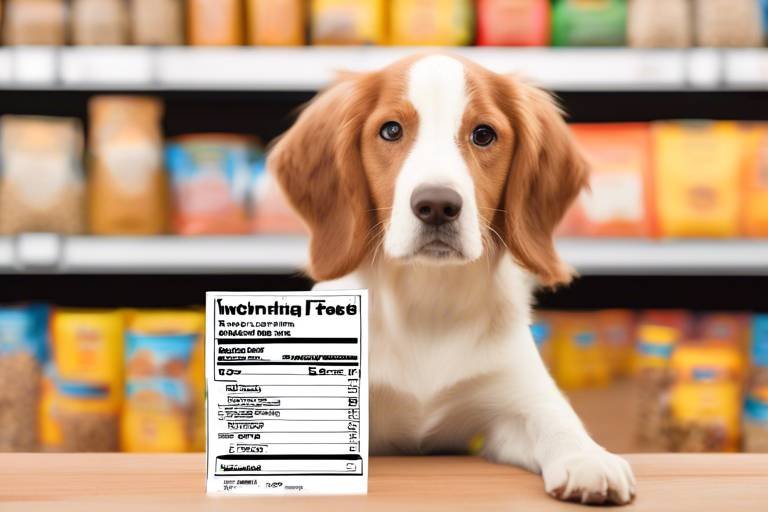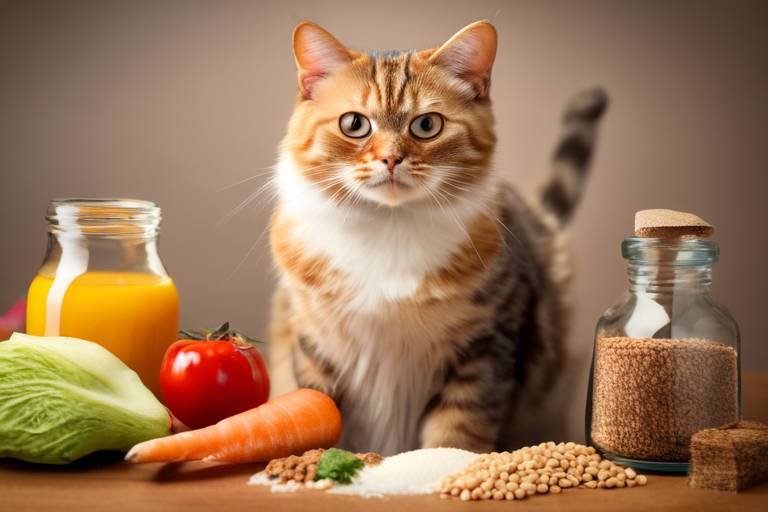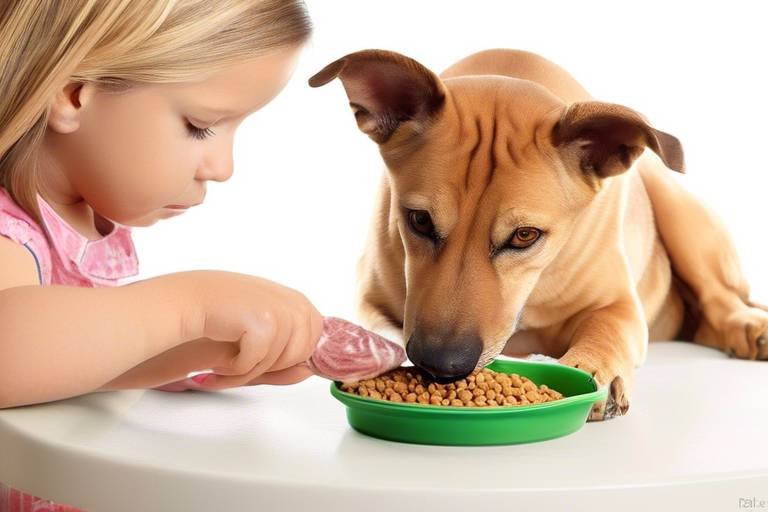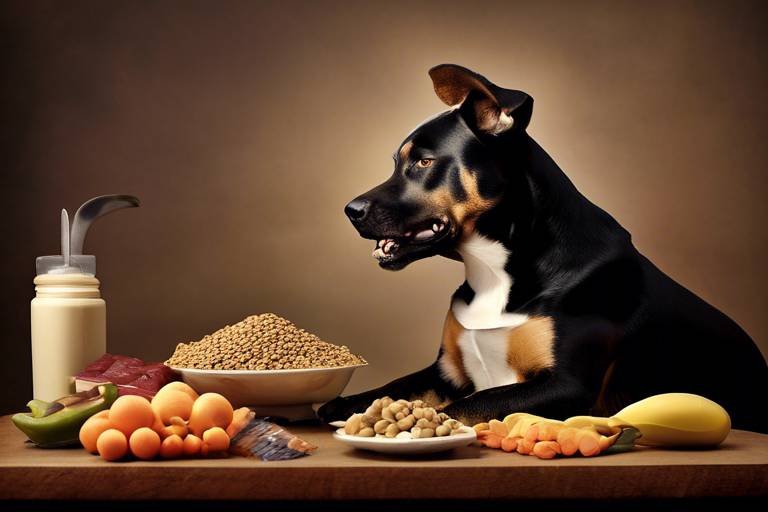The Benefits of Feeding Pets Whole Foods
Are you looking for a way to enhance your furry friend's health and happiness? Well, incorporating whole foods into your pet's diet might just be the golden ticket! Whole foods, which are natural and minimally processed, can work wonders for your pet's overall well-being. Imagine feeding your beloved companion a diet that's not only delicious but also packed with essential nutrients. It's like giving them a gift of health wrapped in a tasty package!
In today's fast-paced world, many pet owners find themselves reaching for convenient, processed pet foods. However, these options often lack the vital nutrients that whole foods provide. Think about it: would you prefer a meal made from fresh, whole ingredients or one that’s been heavily processed and filled with artificial additives? The answer is clear, and the same goes for our pets! Whole foods can lead to improved health, increased energy levels, and even a longer lifespan for your furry friends.
So, what are the specific benefits of feeding your pets whole foods? Well, let’s dive into the details! From enhanced digestion to better weight management, the advantages are plentiful. Whole foods are not just a trend; they represent a shift towards a more natural and health-conscious approach to pet nutrition. By making this change, you're not only investing in your pet's health but also showing them just how much you care.
In the following sections, we will explore the various aspects of whole foods in pet diets, discussing everything from nutritional advantages to practical tips on how to choose the right ingredients. Get ready to transform your pet's meals into a feast of health and vitality!
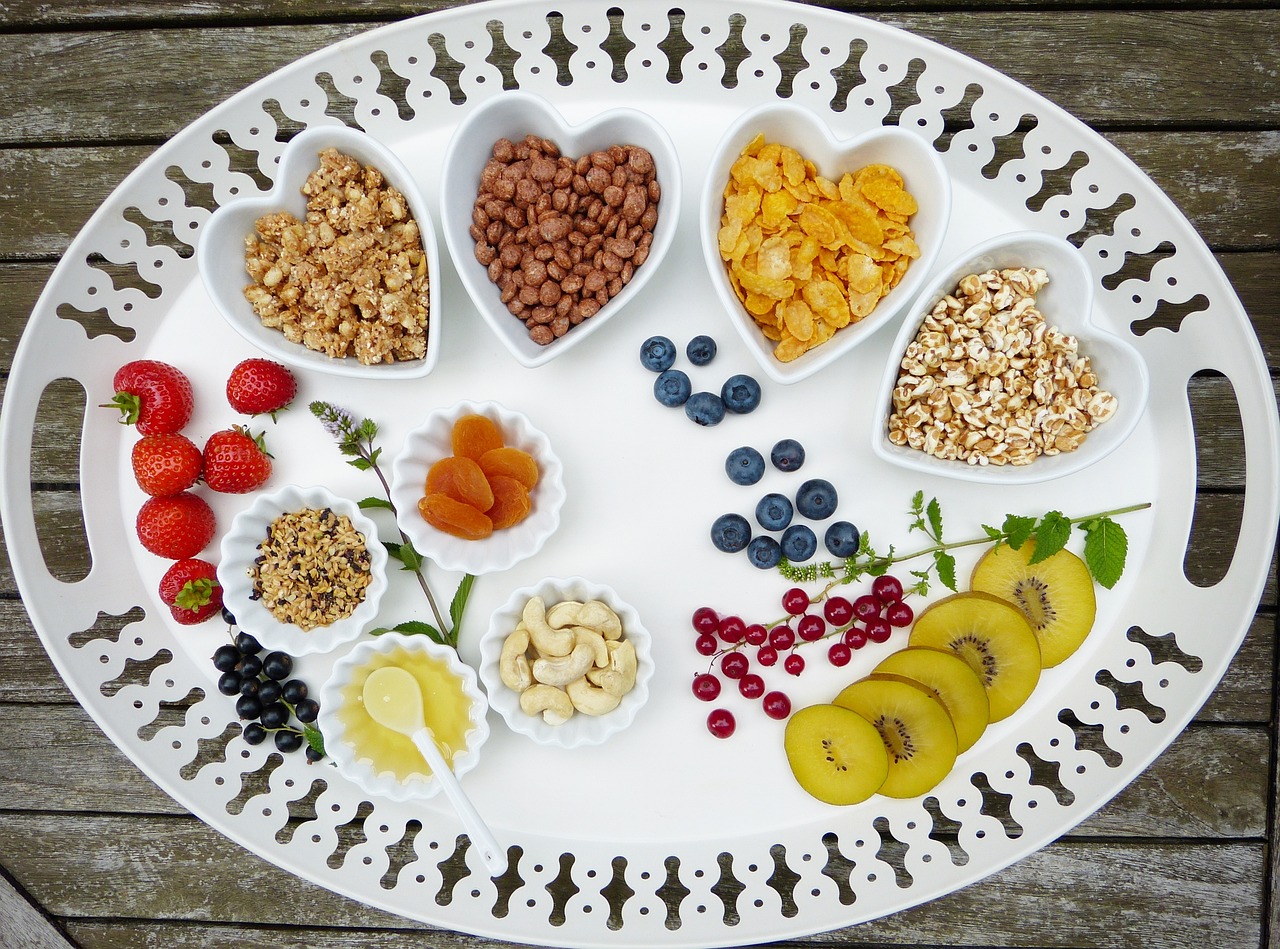
Understanding Whole Foods
When we talk about whole foods, we're diving into a world of nutrition that’s as close to nature as possible. These are the ingredients that have been minimally processed and are free from artificial additives. Imagine walking through a vibrant farmer's market, where the fruits and vegetables are bursting with color and flavor—that's the essence of whole foods. They are not just ingredients; they are a celebration of health and vitality for your furry friends.
Whole foods can be categorized into various groups, including fruits, vegetables, whole grains, and lean proteins. Each of these categories plays a significant role in your pet's diet, providing essential nutrients that processed foods often lack. For instance, fruits like blueberries and apples are packed with antioxidants, while vegetables such as carrots and spinach offer vital vitamins and minerals. Whole grains like brown rice and oats provide energy, and lean proteins from sources like chicken and fish are crucial for muscle development.
What makes whole foods stand out in pet nutrition is their nutritional density. Unlike processed pet foods, which may contain fillers and artificial ingredients, whole foods are rich in nutrients that contribute to your pet's overall health. This means that when you feed your pet whole foods, you're not just filling their belly; you're nourishing their body. It’s like choosing a gourmet meal over fast food for yourself—one is full of goodness, while the other is just empty calories.
Moreover, whole foods are significant in fostering a strong immune system. They are rich in phytonutrients, which are compounds found in plants that help to combat disease and promote health. By incorporating a variety of whole foods into your pet’s diet, you can help ensure they receive a balanced intake of these essential nutrients. Think of it as giving them a shield against common ailments, allowing them to thrive and enjoy life to the fullest.
In conclusion, understanding whole foods is the first step towards enhancing your pet's diet. By choosing natural, minimally processed ingredients, you’re not just making a meal; you’re making a choice for a healthier, happier pet. So, the next time you’re shopping for your furry companion, remember that what you feed them can significantly impact their health and well-being.

Nutritional Advantages
When it comes to our pets, we want nothing but the best for them, right? Well, incorporating whole foods into their diets can be a game-changer! Whole foods are packed with essential nutrients that are often stripped away in processed pet foods. Think of it this way: feeding your pet whole foods is like giving them a gourmet meal instead of fast food. It’s all about quality over quantity!
Whole foods offer a plethora of nutrients that contribute significantly to your pet's health and vitality. These nutrients include:
- Vitamins: Essential for maintaining various bodily functions.
- Minerals: Crucial for bone health and metabolic processes.
- Antioxidants: Help combat free radicals and reduce inflammation.
By choosing whole foods, you’re essentially providing a nutrient-dense diet that supports your pet's immune system, promotes healthy skin and coat, and enhances overall well-being. Imagine the difference in your pet's energy levels and mood when they’re fueled by whole, natural ingredients!
Let’s not forget about digestion! Whole foods can work wonders for your pet’s digestive health. Unlike processed foods that can be hard on their tummies, whole foods are easier to digest due to their natural composition. They contain enzymes and nutrients that promote a healthy gut, making it less likely for your furry friend to experience gastrointestinal issues.
Incorporating fiber-rich whole foods into your pet's diet is essential for maintaining healthy digestion. Fiber acts like a broom for the digestive system, sweeping away waste and keeping things running smoothly. Foods like pumpkin, sweet potatoes, and leafy greens are excellent sources of fiber. They help prevent constipation and promote regular bowel movements, ensuring your pet feels their best!
Did you know that some whole foods are natural sources of probiotics? These beneficial bacteria help maintain a balanced gut microbiome, which is crucial for digestion and overall health. Foods like yogurt (make sure it's safe for pets) and fermented vegetables can give your pet a probiotic boost. Just think of it as a tiny army of good bacteria working to keep your pet's gut happy and healthy!
Another fantastic advantage of feeding pets whole foods is their role in weight management. With the rising rates of pet obesity, it’s more important than ever to ensure our pets maintain a healthy weight. Whole foods are generally lower in calories and higher in nutrients, making them an ideal choice for portion control. When you feed your pet natural ingredients, you’re not just filling their bellies; you’re providing them with the nutrients they need without the empty calories!
Incorporating whole foods can help regulate your pet's weight and prevent obesity-related issues. Imagine your pet being more active and playful, all thanks to a balanced diet that keeps their weight in check!
Whole foods provide sustained energy for our active pets. Unlike processed foods that can lead to energy spikes and crashes, whole foods offer a steady release of energy throughout the day. This means your pet can enjoy longer play sessions and more adventures without feeling sluggish. Who wouldn’t want that for their furry companion?
Lastly, pets that consume whole foods often enjoy longer, healthier lives. There’s a strong correlation between a whole food diet and longevity in pets. Just like humans, the quality of a pet's diet plays a vital role in their overall health and lifespan. By choosing whole foods, you're investing in your pet's future!
In conclusion, the nutritional advantages of whole foods are immense. From improved digestion to enhanced energy levels, the benefits are clear. By making the switch to whole foods, you’re not just changing your pet's diet; you’re transforming their life!
Enhanced Digestion
When it comes to our furry friends, digestion is a crucial aspect of their overall health. Just like us, pets can experience digestive issues that can lead to discomfort and other health problems. By incorporating whole foods into their diets, we can significantly enhance their digestive health. Whole foods are less processed and retain their natural state, which allows them to provide essential nutrients that support a healthy gut.
One of the primary benefits of whole foods is their ability to facilitate better digestion. Unlike processed pet foods that often contain fillers and artificial ingredients, whole foods are packed with natural enzymes and nutrients that aid in breaking down food effectively. This means that your pet can absorb more nutrients, leading to improved health and vitality. Think of it this way: just like a well-oiled machine runs smoothly, a pet with a healthy digestive system benefits from a diet rich in whole foods.
Additionally, whole foods often contain a variety of fiber-rich ingredients. Fiber plays an essential role in digestion by promoting regular bowel movements and preventing constipation. For instance, ingredients like pumpkin, sweet potatoes, and green beans are not only tasty but also loaded with fiber that helps keep your pet's digestive system running smoothly. A diet lacking in fiber can lead to various gastrointestinal issues, including bloating and discomfort.
Furthermore, many whole foods are natural sources of probiotics, which are beneficial bacteria that support gut health. These probiotics help maintain a balanced gut microbiome, which is vital for proper digestion. Foods like plain yogurt (make sure it’s pet-safe) and kefir can be excellent additions to your pet's diet, providing them with the good bacteria they need. The more balanced their gut is, the less likely they are to experience digestive disturbances.
In summary, enhancing your pet's digestion through whole foods is not just a trend; it’s a fundamental approach to ensuring their health and well-being. By choosing natural ingredients that support digestive health, you're not only improving their ability to absorb nutrients but also paving the way for a happier and healthier life for your beloved companion.
Fiber-Rich Options
When it comes to the health of our furry friends, play a pivotal role in their diet. Just like us, pets require a balanced intake of nutrients to thrive, and fiber is one of those unsung heroes that often gets overlooked. But why is fiber so important? Think of fiber as the broom that sweeps through your pet's digestive system, helping to keep everything running smoothly. It not only aids in digestion but also helps to regulate blood sugar levels and maintain a healthy weight, making it essential for your pet's overall well-being.
Incorporating fiber-rich whole foods into your pet's diet can provide a plethora of benefits. For instance, ingredients like sweet potatoes, peas, and pumpkin are not only delicious but also packed with fiber. These foods can help to keep your pet feeling full longer, which is especially beneficial for those pets that tend to overeat or are prone to obesity. When selecting fiber-rich options, consider the following:
- Fruits and Vegetables: Carrots, apples (without seeds), and berries are excellent sources of fiber.
- Whole Grains: Brown rice, oats, and quinoa can provide a healthy dose of fiber.
- Legumes: Beans and lentils are not only high in fiber but also rich in protein, making them a great addition to your pet's diet.
It's important to introduce these fiber-rich options gradually into your pet's meals. Sudden changes in diet can lead to gastrointestinal upset. Start by mixing small amounts of these foods with their regular diet and gradually increase the portion. This will help your pet's digestive system adjust without any discomfort.
Moreover, fiber can also play a crucial role in preventing constipation and promoting regular bowel movements. A well-fibered diet can lead to softer stools, making it easier for your pet to do their business. If your pet has ever struggled with constipation, you know how distressing it can be for both of you. By ensuring they get enough fiber, you can help alleviate this issue and improve their quality of life.
In conclusion, fiber-rich options are a fantastic way to enhance your pet's diet. By choosing whole foods that are high in fiber, you're not only supporting their digestive health but also contributing to their overall vitality and happiness. So, the next time you're at the store, consider picking up some of these fiber-packed goodies for your furry companion. They’ll thank you for it with wagging tails and happy purrs!
1. What are the best fiber-rich foods for pets?
Some of the best fiber-rich foods for pets include sweet potatoes, pumpkin, peas, carrots, and various fruits like apples and berries.
2. How much fiber does my pet need?
The amount of fiber needed can vary based on the pet's size, age, and health. Generally, dogs need about 2-5% fiber in their diet, while cats require around 1-5%. Consult your veterinarian for personalized recommendations.
3. Can too much fiber be harmful?
Yes, too much fiber can lead to digestive issues such as gas or diarrhea. It's essential to introduce fiber gradually and monitor your pet's response.
4. Are there any fiber supplements for pets?
Yes, there are fiber supplements available for pets, but it's always best to try to meet their fiber needs through whole foods first. Consult your veterinarian before adding any supplements to your pet's diet.
Probiotic Benefits
When we think about keeping our furry friends healthy, probiotics might not be the first thing that comes to mind. But here's the scoop: probiotics are like tiny superheroes for your pet's gut health! These beneficial bacteria help maintain a balanced gut microbiome, which is crucial for overall wellness. Just like we need a balanced diet to feel our best, our pets need the same, and probiotics play a significant role in that.
So, what exactly do probiotics do? They help break down food, absorb nutrients, and even fend off harmful bacteria. Imagine your pet's digestive system as a bustling city; probiotics are the traffic cops that ensure everything runs smoothly. When your pet consumes whole foods rich in probiotics, such as yogurt or fermented vegetables, they essentially invite these friendly bacteria to set up camp in their intestines.
But the benefits don’t stop there! Probiotics can also help alleviate gastrointestinal issues, such as diarrhea and constipation. If your pet has ever had an upset stomach, you know how distressing that can be—not just for them, but for you too! By incorporating probiotic-rich whole foods into their diet, you can help keep their digestive system in check, making for a happier, healthier pet.
Some of the best whole food sources of probiotics include:
- Yogurt: Ensure it’s plain and unsweetened.
- Kefir: This fermented milk drink is packed with beneficial bacteria.
- Fermented vegetables: Options like sauerkraut or kimchi can be great additions, but ensure they are pet-safe.
Incorporating these foods into your pet's diet can be as simple as mixing a spoonful of yogurt into their regular meal or offering a small amount of kefir as a treat. Just remember, moderation is key! Too much of a good thing can lead to an upset tummy, so always introduce new foods gradually.
In summary, probiotics are essential for your pet's digestive health. They not only help with nutrient absorption but also support a robust immune system. So, the next time you're at the store, consider picking up some whole foods that are rich in probiotics. Your pet will thank you with wagging tails and happy purrs!
Q: Can I give my pet human probiotics?
A: While some human probiotics are safe for pets, it's best to consult your veterinarian for recommendations tailored to your pet's needs.
Q: How can I tell if my pet needs probiotics?
A: Signs that your pet may benefit from probiotics include digestive issues, changes in appetite, or a dull coat. Always consult your vet for a proper diagnosis.
Q: Are there any side effects of probiotics for pets?
A: Most pets tolerate probiotics well, but some may experience mild digestive upset. Start with small amounts and monitor your pet's reaction.
Weight Management
When it comes to our beloved pets, maintaining a healthy weight is crucial for their overall well-being. Just like humans, pets can struggle with weight issues, and feeding them whole foods can be a game changer. Whole foods are not just a trend; they are a lifestyle choice that can profoundly impact your pet's health and longevity. By incorporating these natural, minimally processed ingredients into their diet, you can help your furry friends achieve and maintain a healthy weight.
One of the key benefits of whole foods is their ability to promote satiety. Unlike processed pet foods that are often loaded with fillers and empty calories, whole foods are dense in nutrients and fiber, which means they keep your pet feeling full longer. Imagine feeding your pet a bowl of kibble that barely fills them up versus a hearty serving of whole grains, lean meats, and fresh vegetables. The latter not only satisfies their hunger but also provides essential nutrients that support their health.
Another significant advantage of whole foods in managing weight is their ability to regulate metabolism. Whole foods are rich in nutrients that support metabolic functions, helping your pet burn calories more efficiently. For example, incorporating protein-rich foods can promote muscle development, which in turn boosts metabolism. A diet high in whole foods can also help stabilize blood sugar levels, preventing those dreaded energy crashes that often lead to overeating.
To illustrate the difference in weight management between whole foods and processed foods, consider the following table:
| Type of Food | Calories per Serving | Nutritional Value | Satiety Level |
|---|---|---|---|
| Processed Pet Food | 350 | Low | Low |
| Whole Foods | 300 | High | High |
As you can see, while processed pet food may seem convenient, it often lacks the nutritional punch that whole foods provide. When your pet feels satisfied and nourished, they are less likely to beg for extra treats or snacks, helping to keep their weight in check.
However, it’s essential to remember that not all whole foods are created equal. Some ingredients can be calorie-dense, so moderation is key. For instance, while avocados are packed with healthy fats and nutrients, they should be given in small amounts. Always consult with your veterinarian to tailor a whole food diet that meets your pet's specific needs, considering their age, breed, and activity level. This personalized approach ensures that your pet gets the right balance of nutrients without unnecessary weight gain.
In conclusion, feeding your pet whole foods is a powerful strategy for effective weight management. By choosing natural ingredients that promote satiety, regulate metabolism, and provide essential nutrients, you can help your furry companion lead a healthier, happier life. Remember, a healthy pet is a happy pet!
- What are whole foods for pets? Whole foods are natural, minimally processed ingredients that provide essential nutrients without fillers or artificial additives.
- How can whole foods help with my pet's weight? Whole foods are nutrient-dense and promote satiety, helping your pet feel full longer and manage their weight more effectively.
- Can I mix whole foods with commercial pet food? Yes, but it’s best to consult with your veterinarian to ensure a balanced diet that meets your pet's nutritional needs.
- Are there any whole foods I should avoid? Yes, some foods like chocolate, grapes, and onions are toxic to pets. Always research or consult your vet before introducing new foods.

Improved Energy Levels
When it comes to our furry friends, their energy levels can often reflect their overall health and well-being. Just like us, pets require a balanced diet to fuel their daily adventures, whether it's chasing a ball in the park or simply exploring the backyard. By incorporating whole foods into their diets, you can significantly boost their energy levels, making them more vibrant and playful.
Whole foods are packed with essential nutrients that provide a steady source of energy. Unlike processed pet foods, which may contain fillers and artificial ingredients, whole foods are rich in vitamins, minerals, and healthy fats. These nutrients work together to optimize your pet's metabolism, ensuring they have the stamina to keep up with their daily activities. For instance, high-quality proteins from whole food sources like chicken, beef, or fish are crucial for muscle repair and growth, which in turn supports their energy levels.
Moreover, whole foods are often more digestible than their processed counterparts. This means that pets can absorb more nutrients from their meals, translating to better energy levels. Think of it this way: if you were fueling your car with premium gasoline versus low-quality fuel, which one would you choose for a smoother ride? The same logic applies to your pets. By providing them with whole foods, you're essentially giving them the "premium fuel" they need to thrive.
Additionally, whole foods can help stabilize your pet's blood sugar levels. Fluctuating blood sugar can lead to energy crashes, leaving your pet feeling lethargic and disinterested in playtime. Foods that are rich in complex carbohydrates, such as sweet potatoes and brown rice, release energy slowly, keeping your pet energized throughout the day. This steady energy release is akin to a marathon runner pacing themselves, rather than sprinting and burning out quickly.
To illustrate the benefits of whole foods on energy levels, consider the following table that compares the nutritional profiles of processed pet food versus whole food options:
| Nutrient | Processed Pet Food | Whole Food Options |
|---|---|---|
| Protein | Moderate | High |
| Healthy Fats | Low | High |
| Fiber | Low | High |
| Vitamins & Minerals | Artificial Additives | Natural Sources |
In summary, feeding your pets whole foods not only enhances their energy levels but also contributes to their overall vitality. A diet rich in natural ingredients can lead to a more active, playful, and enthusiastic companion. So, the next time you're at the pet store or preparing your pet's meals at home, remember that choosing whole foods is like giving your pet a ticket to a more energetic and fulfilling life!
Q: What are some examples of whole foods for pets?
A: Whole foods for pets include fresh meats, fish, fruits, vegetables, and whole grains. Some great options are chicken, beef, sweet potatoes, carrots, and blueberries.
Q: Can I mix whole foods with commercial pet food?
A: Yes, you can mix whole foods with commercial pet food, but it's essential to ensure that the overall diet remains balanced and meets your pet's nutritional needs.
Q: Will my pet adapt quickly to a whole food diet?
A: Many pets adapt well to whole foods, but it’s best to transition gradually to avoid digestive upset. Start by mixing small amounts of whole foods with their regular diet and increase over time.
Q: Are there any risks associated with feeding pets whole foods?
A: While whole foods are generally safe and healthy, it's crucial to avoid toxic foods such as onions, garlic, and chocolate. Always consult with your veterinarian before making significant dietary changes.
Longer Lifespan
When it comes to our beloved pets, we all want them to live long, happy lives, right? Well, feeding them a diet rich in whole foods can significantly contribute to that goal. Just like how we feel more energetic and vibrant when we eat healthy, our furry friends experience similar benefits. Whole foods are packed with essential nutrients that not only support daily health but also play a crucial role in extending their lifespan.
Research has shown that pets who are fed a diet consisting of whole foods often enjoy a lower risk of chronic diseases, which can be a major factor in their longevity. These natural ingredients are less likely to contain harmful additives or preservatives that can lead to health complications over time. Instead, they provide a wealth of vitamins, minerals, and antioxidants that bolster the immune system and keep diseases at bay.
For instance, consider the difference between a processed kibble diet and a whole food diet. The former might contain fillers and artificial ingredients that can lead to obesity, diabetes, or even heart disease. In contrast, whole foods like lean meats, fresh vegetables, and whole grains offer balanced nutrition that helps maintain a healthy weight and supports overall well-being. A healthy weight is essential, as obesity is one of the leading causes of shortened lifespans in pets.
Moreover, the antioxidants found in whole foods combat oxidative stress, which is a significant contributor to aging. These powerful compounds work to neutralize free radicals in the body, reducing cellular damage and promoting longevity. By incorporating foods like blueberries, spinach, and sweet potatoes into your pet's diet, you can help them fight off the effects of aging and enjoy a more vibrant life.
But it's not just about what you feed your pets; it's also about how you feed them. Creating a balanced meal plan that includes a variety of whole foods is key. For example, a combination of:
- High-quality protein sources like chicken, fish, or beef
- Fiber-rich vegetables such as carrots and peas
- Healthy fats from sources like fish oil or flaxseed
can work wonders for their health. This variety ensures they receive a full spectrum of nutrients necessary for their growth and vitality.
In conclusion, feeding your pets whole foods is not just a trend; it's a lifestyle choice that can lead to a longer, healthier life. By prioritizing their nutrition, you’re investing in their future and ensuring that they remain your playful companions for many years to come. So why not take a step towards enhancing their diet today? They deserve the best, don’t they?
Q: What are whole foods for pets?
A: Whole foods for pets are natural, minimally processed ingredients that provide essential nutrients without harmful additives. Examples include fresh meats, vegetables, and whole grains.
Q: How can whole foods improve my pet's health?
A: Whole foods are rich in vitamins, minerals, and antioxidants that support immune function, promote healthy weight, and enhance digestion, leading to overall better health.
Q: Can I transition my pet to a whole food diet easily?
A: Yes! It's best to gradually introduce whole foods into your pet's diet over a week or two to avoid digestive upset. Start by mixing small amounts of whole foods with their current diet.
Q: Are there any specific whole foods I should avoid?
A: Yes, some foods like onions, garlic, chocolate, and grapes are toxic to pets and should be avoided. Always consult your veterinarian before introducing new foods.

Choosing the Right Whole Foods
When it comes to feeding your furry friends, choosing the right whole foods can feel like navigating a maze. With so many options available, how do you know what’s truly best for your pet? First off, it’s essential to understand that not all whole foods are created equal. You want to look for ingredients that are natural, fresh, and minimally processed. Just like us, pets thrive on a diet rich in nutrients, and whole foods can provide that in spades.
Start by considering your pet’s specific needs. For instance, if you have an active dog that loves to run and play, they might benefit from whole foods that are higher in protein and healthy fats, such as lean meats and fish. On the other hand, a more sedentary pet might need a diet that focuses on fiber-rich vegetables and whole grains to maintain a healthy weight. Remember, it’s not just about what you feed them, but also about how those foods can support their unique lifestyle.
One of the best ways to ensure you’re selecting the right whole foods is to read labels carefully. Look for ingredients that you can recognize; if it sounds like something from a chemistry class, it’s probably best to avoid it. Whole grains, fresh fruits, and vegetables should be at the top of your list. Additionally, consider incorporating healthy fats like fish oil or flaxseed oil, which can provide essential omega-3 fatty acids for your pet’s coat and skin health.
It’s also beneficial to introduce a variety of whole foods into your pet's diet. Just like humans, pets can get bored with their meals if they’re always the same. Mixing it up not only keeps mealtime exciting, but it also ensures that your pet gets a broad spectrum of nutrients. For example, you might rotate between different types of meats, grains, and vegetables throughout the week. This approach can help prevent nutritional deficiencies and keep your pet feeling their best.
Lastly, don’t hesitate to consult with a veterinarian or a pet nutritionist. They can provide personalized recommendations based on your pet’s age, weight, and health conditions. They can also help you navigate any dietary restrictions your pet may have, ensuring you choose the right whole foods that align with their health goals. After all, when it comes to our beloved pets, we want to give them the very best!
- What are whole foods?
Whole foods are natural, minimally processed ingredients that provide essential nutrients for pets. - How do I know if a food is a whole food?
Look for ingredients that are recognizable and avoid those with artificial additives or preservatives. - Can I mix different whole foods?
Yes! Mixing different whole foods can provide a variety of nutrients and keep your pet’s meals interesting. - Should I consult a vet before changing my pet's diet?
Absolutely! A vet can provide tailored advice based on your pet's specific health needs.
Frequently Asked Questions
- What are whole foods for pets?
Whole foods for pets refer to natural, minimally processed ingredients that are rich in essential nutrients. These include fresh fruits, vegetables, and high-quality proteins that support your pet's overall health and well-being. Think of it as feeding your furry friend the same wholesome foods you enjoy!
- How do whole foods benefit my pet's health?
Whole foods provide a myriad of nutritional advantages, including vitamins, minerals, and antioxidants. These nutrients help boost your pet's immune system, improve digestion, and enhance energy levels. It's like giving your pet a superfood boost every day!
- Can whole foods improve my pet's digestion?
Absolutely! Whole foods, especially those rich in fiber, can significantly enhance your pet's digestive health. They help maintain a healthy gut, prevent gastrointestinal issues, and ensure your pet feels their best. It's like giving their tummy a little hug!
- What role does fiber play in my pet's diet?
Fiber is crucial for promoting healthy digestion in pets. It aids in regulating bowel movements and contributes to a feeling of fullness, which can help with weight management. Think of fiber as the broom that sweeps through your pet's digestive system!
- Are there probiotics in whole foods?
Yes! Certain whole foods contain natural probiotics that support a balanced gut microbiome. These probiotics can enhance digestion and overall health, making your pet feel vibrant and energetic. It's like giving their gut a friendly boost!
- How can whole foods help with weight management?
Whole foods can assist in maintaining a healthy weight by providing balanced nutrition without empty calories. Natural ingredients help regulate your pet's appetite and prevent obesity-related issues. It's a smart way to keep your pet fit and fabulous!
- Will feeding whole foods increase my pet's energy levels?
Definitely! Whole foods provide sustained energy, helping your active pet stay lively throughout the day. A diet rich in these natural ingredients fuels your pet's adventures, making playtime even more fun!
- Can a whole food diet lead to a longer lifespan for my pet?
Research suggests that pets consuming whole foods often enjoy longer, healthier lives. The nutritional benefits contribute to overall well-being, reducing the risk of chronic diseases. It's like investing in your pet's future!
- How do I choose the right whole foods for my pet?
When selecting whole foods, look for high-quality ingredients that are appropriate for your pet's species, age, and health needs. Always consult with your vet to ensure you're making the best choices for your furry friend. Think of it as being a gourmet chef for your pet!


